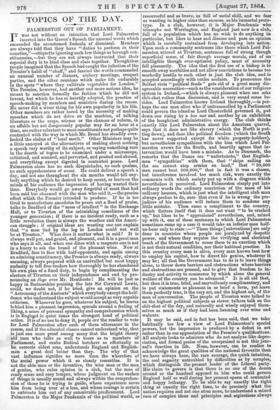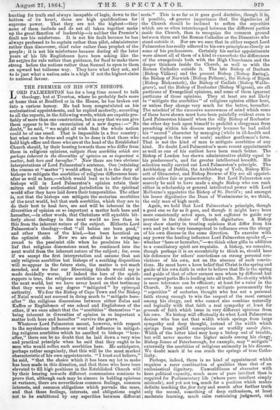TOPICS OF THE DAY.
PALMERSTON OUT OF PARLIAMENT.
IT was not without an intention that Lord Palmerston inserted into the Queen's Speech the unusual words which succeeded the accustomed formula of dismissal. Members are always told that they have "duties to perform in their counties,"—etiquette ignoring such low things as borough con- stituencies, —but they are not always instructed that their especial duty is to bind class and class together. Thoughtless people imagined that the Speech had caught the infection of the Premier's habit of "chaff," and fancied the words commanded an unusual number of dinners, archery meetings, croquet parties, and the other reunions which make life endurable in the spots "where they cultivate vegetables for London." The Premier, however, had another and more serious idea, he meant to sanction formally the fashion which he did not invent, but which he has so heartily adopted, the practice of speech-making by members and ministers during the recess. He never did a wiser thing for his own popularity in his life. Other members are rather bored by the necessity of making speeches which do not drive on the machine, of talking literature or the crops, science or the chances of reform, in an affable but not dangerously popular way for an hour at a time, are rather reluctant to meet constituents not perhaps quite contented with the way in which Mr. Brand has steadily over- looked the claims of "local merit." Other Ministers may be a little annoyed at the alternatives of making about nothing a speech very worthy of its subject, or saying something sure in the dearth of topics to be examined under a microscope, criticized, and scanned, and perverted, and praised and abused, and everything except digested in contented peace. Lord Palmerston alone has no such disquietudes, no such qualms, no such apprehensions of ennui. He could deliver a speech a day, and not one throughout the six months would tell any- body anything which he desired to keep secret, or leave on the minds of his audience the impression of having wasted their time. Everybody would go away forgetful of most that had been said but charmed with the man who said it,—the precise effect which the Premier intended to produce. If he is too tired to manufacture anecdotes he pours out a flood of praise, talks to Bradford of the "mass of intellect" in the Exchange Hall, or to Tiverton of the astonishing comeliness of the younger generation ; if there is no incident ready, such as a little revolution there is always the weather and the Ameri- can struggle ; if original ideas are wanting one can explain that "a man tied by the leg in London could not well be at Tiverton." What does it matter what is said ? It is always well put, and genial, and pleasant, and it is a great man who says it all, and when one dines with a magnate one is not in a hurry to ask the brand of the pleasant wine. Now at Bradford, face to face with half-opponents, and again among an admiring constituency, the Premier is always ready, always amusing, always prepared with an unrivalled but most happy audacity to tell free-traders how thoroughly he has abandoned his own plan of a fixed duty, to begin by complimenting the electors of Tiverton on their independence and end by pro- nouncing an eloge over Mr. Heathcote ! He will be just as happy in Radnorshire praising the late Sir Cornwall Lewis, could, we doubt not, if he tried, give an opinion on the "Astronomy of the Ancients" which everybody except the half. dozen who understand the subject would accept as very capable criticism. Wherever he goes, whatever his subject, he leaves behind him a pleasant impression, spreads around a feeling of liking, a sense of personal sympathy and comprehension which is in Englaild in quiet times the strongest bond of political action. It is of no use to deny it, people are the readier to vote for Lord Palmerston after each of these utterances in the recess, and if the educated classes cannot understand why, that is just one more proof among many that the bright cheery old man who talks as well to boors as to members of Parliament, and snubs Radical butchers as effectually as he corrects eldest sons, understands England and English- men a great deal better than they. The why of that vast influence signifies no more than the wherefore of the social power which it so closely resembles. It is not the able man or the inventive, the wise man or the man of genius, who rules opinion in a club, but the man of ready sense and easy temper, whose judgment on the surface of things is usually sound and always within the comprehen- sion of those he is trying to guide, whose experience saves him from being ever at a loss, and whose courage is certain to extricate him out of any conceivable predicament. Lord Palmerston is the Major Pendennis of the political world, as resourceful and as brave, as full of social skill, and we fear.
as wanting in higher aims than success, as his immortal proto- type. In a club, however, it is Major Pendennis who triumphs not Warrington, and England just now is a club, full of a population which has no wish to do anything in particular, but likes to hear and discuss and pass an opinion which is carefully restrained from developing into action. Upon such a community sentences like those which Lord Pal- merston uttered at Tiverton, sentences full of strong though superficial sense, of fair though average morals, and of an intelligible though over-optimist policy, must of necessity fall pleasantly. The idea that the first use of a bishop is to smooth away acerbities and not allow convictions to become too markedly hostile to each other is just the club idea, and is accepted accordingly with entire acclaim. To pronounce the Belfast riots "political feuds" gets rid of a great many dis- agreeable necessities—such as the consideration of our religious system in Ireland,—which is always pleasant when one asks chit-chat rather than discussion, and is very sound sense be- sides. Lord Palmerston knows Ireland thoroughly,—is per- haps the one man alive who if untrammelled by a Parliament could govern the island as Lord Chesterfield governed it, put down one rising by a bon mot and another by an exhibition of the haughtiest administrative energy. The club thinks exactly like Lord Palmerston about the American quarrel, says that it does not like slavery (which the North is put- ting down), and does like political freedom (which the South has never supported except for white property-holders), but nevertheless sympathizes with the bias which Lord Pal- merston avows for the South, and heartily agrees that in- tervention would have been a mistake. As to Denmark, the remarks that the Danes are "unfortunate," that English- men "sympathize" with them, that "ships sailing on the sea cannot stop armies on land," that "30,000 men cannot beat 300,000," that in fact it was a shame, but interference involved too much risk, were exactly the comments with which society put up with a disgrace which nevertheless it perceived. Lord Palmerston simply put into ordinary words the ordinary conviction of the mass of Ms ordinary hearers, which is just what the intelligent club man always prefers to do, sure that even if he is wrong the pre- judices of his audience will induce them to condone any little mistake. Then came a compliment to the country, which flatters itself that it does not want "to be cracked up," but likes to be "appreciated" nevertheless, and, mixed up with it, one of those sentences in which Lord Palmerston sometimes sums up a case it would take an inferior man half- an-hour only to state :—" These things [subventions] are only done in countries where people are paralyzed by despotic power, and where they require the vivifying and electrical touch of the Government to rouse them to an exertion which is not their natural condition, nor their habitual practice. In this country every man is alive, every man knows best how to employ his capital, how to direct his genius, whatever it may be ; all that the Government has to do is to leave things alone, to throw down barriers and obstructions where barriers and obstructions are pressed, and to give that freedom to in- dustry and activity to commerce by which alone the general welfare of the country can be advanced." It is all old that, but then it is true, brief, and marvellously complimentary, and to put statements so pleasant in so brief a form, yet leave them perfectly true, is the very art, and the highest art, of the man of conversation. The people of Tiverton were talked to on the highest political subjects as clever talkers talk on the chit-chat of the day, and naturally and wisely enjoyed them- selves as much as if they had been listening over wine and walnuts.
It may be said, and in fact has been said, that we take habitually too low a view of Lord Palmerston's special powers, but the impression is produced by a defect in art rather than in our appreciation of the Premier's qualifications. All analysis looks to admirers who do not analyze like depre- ciation, and formal praise of the overpraised is not this jour- nal's function in life. None, however, can be readier to acknowledge the great qualities of the national favourite than we have always been, the rare courage, the quick intuition, the cool sagacity untroubled by difficulties as by scruples, which distinguish the present leader of the Liberal party. His claim to govern is that there is no one of the dozen around or the hundred opposed to him who could govern England half so well during her present spasm of contented and happy lethargy. To be able to say exactly the right thing at exactly the right time, to do precisely what the nation requires and not one atom more, to understand a mixed race of complex ideas and principles and aspirations always hunting for truth and always incapable of logic, down to the bottom of its heart, these are high qualifications for aupreme power. That they are not the highest—they none of them include and do not all taken together make up the great function of leadership—is neither the Premier's fault nor his misfortune. It is not his fault because he has .always professed to be captain rather than pilot, administrator rather than discoverer, chief ruler rather than prophet of the people ; it is not his misfortune because during all the later years of his life Englishmen have been asking like the Isr aentes for rule rather than guidance, for Saul to make them strong before the nations rather than Samuel to open to them an upward but toilsome way. They have what they ask, and to be just what a nation asks is a high if not the highest claim to national favour.































 Previous page
Previous page